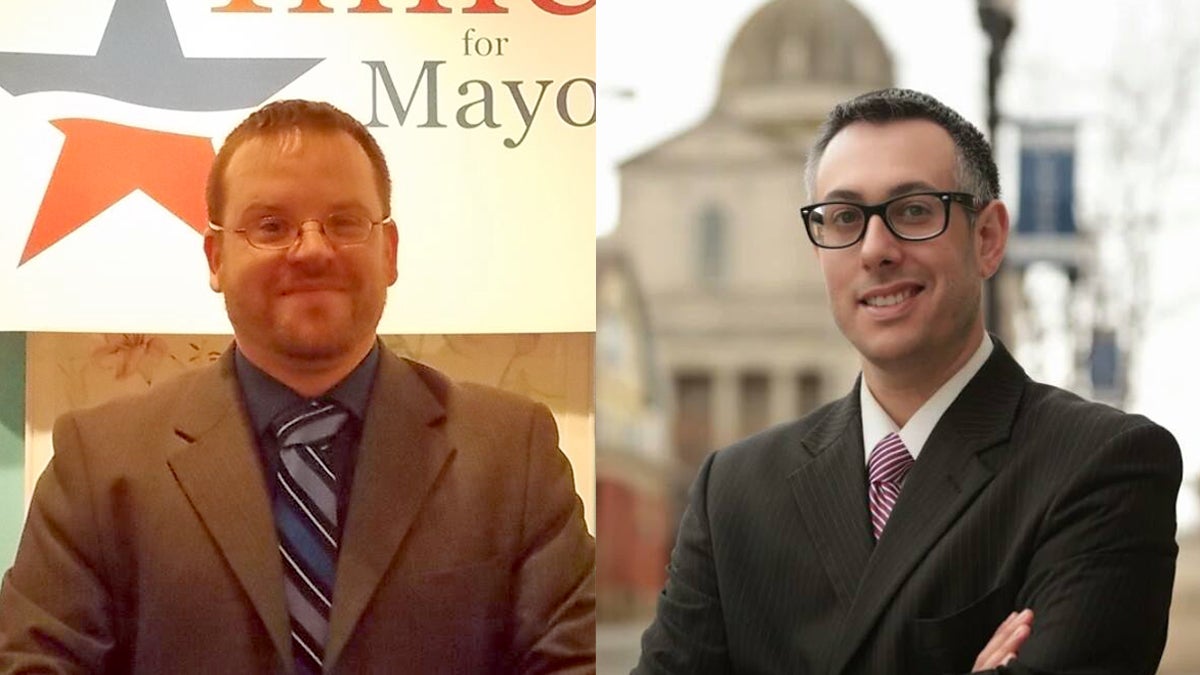Altoona electing first full-time mayor in decades

Democrat challenger Jason Imler (left) or Republican incumbent Matt Pacifico will become Altoona's first full-time mayor in 25 years. (Images courtesy of the candidates)
When the candidates in the Altoona mayor’s race met for a debate, they had to do something unusual: explain the position they are running for.
When the candidates in the Altoona mayor’s race met for a debate, they had to do something unusual: explain the position they are running for. Altoona, the tenth largest city in the state, is preparing to elect its first full-time mayor in 25 years. Many residents still aren’t sure what the change will mean for the city.
The position will be quite different from the current part-time job. It’s not just more hours: the full-time mayor is part of Altoona’s plan to get out of Act 47, the state distressed city designation.
Wayne Hippo, a former part-time mayor who headed the government study commission, says having a full-time mayor will mean having a full-time advocate for the city.
“The role of this mayor is going to be setting policy, being a leader and working hard to create an environment that can provide for economic growth for the city,” says Hippo.
Home rule
Last November was another momentous election for Altoona. The city voted to move into home rule, meaning they are now governed by a locally designed charter rather than the statewide Third Class City code.
“The city has been transitioning since about January,” says Hippo. “But obviously, a huge part of the change is going to take place Tuesday, and once the new mayor takes in, [home rule] will be fully functioning.”
Voting into home rule was part of Altoona’s plan to get out of Act 47. The Third Class City code prevented the city from creating new taxes, or raising those already in place. The local charter lifts those restrictions, which is part of why Altoona took so long to vote into home rule: residents were hesitant to raise their own taxes.
Residents were less hesitant on the issue of a full-time mayor.
“I remember someone coming up to me one time and saying they’d called the mayor’s office, and they’d been told, there is no hour you can contact the mayor,” says Richard Flarend, a member of the government study commission. “Voters need to be able to pick up the phone or walk into the office and contact the mayor when they need to.”
Jason Imler, the Democratic candidate for mayor, sees the new position as a chance to advocate for Altoona by “talking to people in neighboring communities and in counties. It’s going to require going to Harrisburg, and sometimes to Washington, D.C. and sometimes to the halls of power and business.”
His opponent, Republican Matt Pacifico, is the incumbent. Pacifico says he’s been treating the position as full-time already, devoting more time to the job than previous mayors.
In the debate, Pacifico said he’s already working closely with the state government in Harrisburg and mayors of other cities, like Lancaster.
Perks of the job
The part-time mayor’s salary is $4,800 a year. Whoever wins on Tuesday will earn $75,000 a year plus benefits. That’s typical for the mayor of a city this size, and will allow the full-time mayor to be truly full-time.
When Hippo was mayor of Altoona, he found “there’s only so much time you can focus on a crisis before you have to go back to your real job and real paycheck.”
He believes the government study commission found a balance — the salary is that of a full-time job, but it’s not so large that “anyone would go after the job for the money.”
But that kind of pay raise means there’s a lot on the line. Alice Flarend is a teacher in Altoona, and married to Richard Flarend.
“I don’t think it automatically applies that it’s the same job,” says Flarend. “I think a full-time job comes with more than double the responsibility of what the part-time job was.”
Higher pay and higher expectations, await Altoona’s first full-time mayor in a quarter century.
WHYY is your source for fact-based, in-depth journalism and information. As a nonprofit organization, we rely on financial support from readers like you. Please give today.


